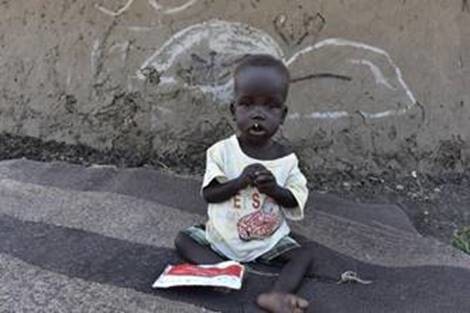About a million children face starvation in South Sudan amid calls for an urgent and large-scale global response to help avert a humanitarian crisis, Save the Children said today.
In a statement, the children’s organizations said about 11 million children under five face extreme hunger or starvation across 11 countries in Africa, the Caribbean, the Middle East, and Asia.
“Save the Children is particularly concerned for children in five ‘hunger hotspot’ countries/regions where the food crisis is extremely serious, made worse by insecurity: Afghanistan, Yemen, South Sudan, Democratic Republic of Congo and the Central Sahel (Mali, Niger & Burkina Faso). COVID-19, conflict, and climate change could tip millions of families over the edge,” the statement reads in part.
Save the Children’s CEO Inger Ashing said children's lives are at risk of acute hunger caused by a persistent lack of access to nutritious food threatening efforts towards reducing child mortality and alleviating poverty.
“Ending global hunger and malnutrition will not be easy. The international community must address the root causes of food shortages and malnutrition while at the same time providing immediate support to hungry and undernourished children,” he said. “Only by putting an end to global conflicts, tackling chronic poverty as well as the risks brought by climate change, and building more resilient communities with access to strong nutrition services, will we be able to ensure that every child can grow up healthy. The time to act is now. Millions of children’s lives hang in the balance.”
According to Save the Children, lack of nutritious food for children under five can cause stunted growth, impede mental and physical development, increase risks of developing other illnesses, and untimely cause of death.
The analysis reveals that in war-torn Yemen, 10.3 million children are facing food shortages with more than half a million children under five suffer acute malnutrition, and 1.5 million and 4 million children facing hunger in Afghanistan and the Democratic Republic of Congo (DRC) respectively.
Ashing said, “Conflict, insecurity, a changing climate, extreme weather events, and recent invasions of desert locusts are all driving up levels of global hunger and malnutrition, leaving entire populations extremely vulnerable to additional shocks like COVID-19 and its secondary impacts, including lockdowns, school closures, and economic recession.”
“Save the Children is calling for the international community to act fast to avoid a potentially devastating loss of life. The aid agency is also asking world leaders to prioritize humanitarian responses that provide urgent assistance to families facing hunger. Providing cash and vouchers directly to families – alongside essential nutrition support – is one of the best ways to address hunger and malnutrition in the short-term, as well as support more long-term community resilience enabling families to better withstand future shocks,” the statement concluded.




